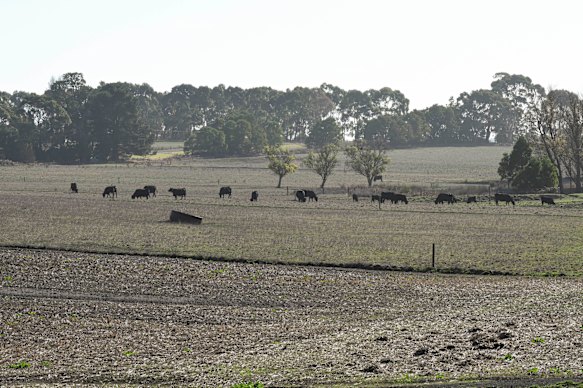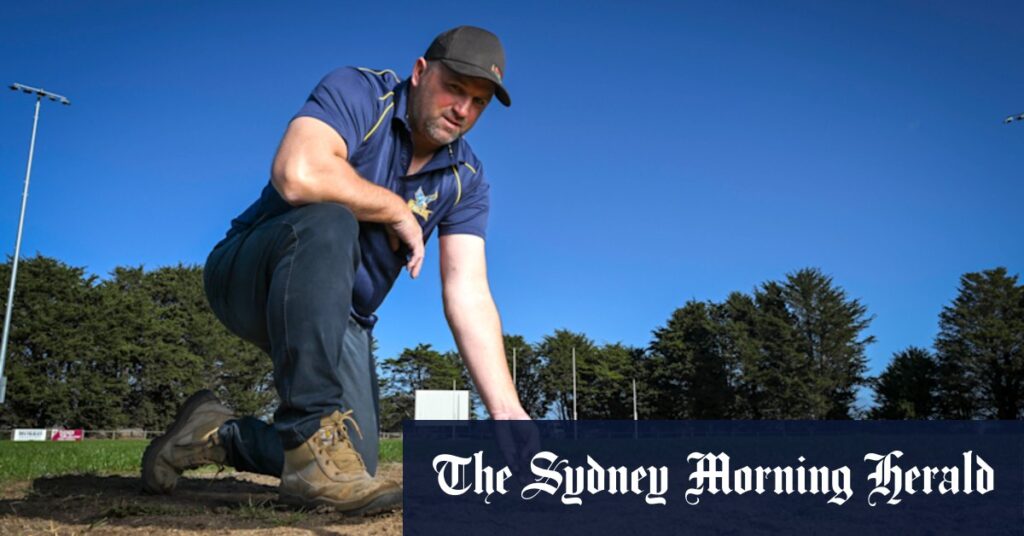The meagre grass cover at the ground was only possible thanks to water supplied from a nearby property when the club was trying to resow the ground.
Nearby dairy farmer Josh Parsons pumped water from his dam to the football ground in March. But with the water level now dropping below halfway, Parsons said he was no longer able to continue providing water.
Josh Parsons at the dam he used to help pump water to Irrewillipe’s football ground.Credit: Eddie Jim
“If it doesn’t fill this winter, I’ve got to get through all next summer as well,” he said.
Parsons, who milks 300 cows and has 600 acres of land, said last autumn was terrible, and this one had been worse. He said he began the summer with enough fodder that would usually last well over 1½ years. But without rain, Parsons said that would be gone by late August.
Although winter typically brings reliable rain in south-west Victoria, the region is now into its second year of prolonged dry weather. Colac has had its lowest rainfall on record for an 18-month period ending in April, according to the Bureau of Meteorology.
Colac’s water storages are now down to about 50 per cent. In the 25 months since April 2023, the coastline from Warrnambool to Cape Otway has had its lowest rainfall on record.

The drought has exacted a savage toll on south-west Victoria. Credit: Eddie Jim
Monash University climate scientist Ailie Gallant said heavy rain events were now required to break the drought.
“Unfortunately, at the moment there’s no indication they’re on the horizon,” she said.
Gallant said storms, particularly in south-west Victoria, had been less frequent or dropping smaller quantities of rain than usual. The regions from Adelaide through to south-western Victoria were the areas hit the hardest by drought, she said.
Loading
“For a drought to go on this long and have these consistently low monthly rainfalls – that’s a big deal. It’s not good,” she said.
Gallant said while south-west Victoria might still be receiving higher rainfall totals than other typically dry regions, it was still causing widespread social problems and undermining agriculture in drought-affected areas.
“Drought is all relative to the location,” she said. “It’s not going to be as dry necessarily as Mildura. But the point is that the south-west area is used to higher rainfall.”
The Victorian government has faced a fierce backlash from farmers after it sought to introduce a new Emergency Services and Volunteers Fund, to replace the Fire Services Property Levy, under which property owners pay to help fund the Country Fire Authority and Fire Rescue Victoria.
From July the new levy will fund all emergency services. But farmers had railed against the government’s plans after many faced levy increases of up to 150 per cent.
The state government has extended drought support across Victoria. Credit: Joe Armao
On Friday, Premier Jacinta Allan announced a one-year pause on the contentious tax hike for farmers. The government also announced extended drought relief measures after weeks of political pressure. In a statement, the government said that rainfall in May reached the worst-case scenario projected at the beginning of the month.
It committed an additional $37.7 million in drought funding, providing $5000 in grants to provide support on farms. That figure will rise to $10,000 for farmers in south-west Victoria and parts of the Wimmera, where the drought has hit particularly hard.
The government said the conditions had left paddocks and dams dry while fodder prices had doubled. In May, the government agreed to allow farmers in 24 drought-affected areas to pay a reduced emergency services levy. On Friday, it extended that to all primary producers for the 2025-26 year.
Allan said the drought was affecting farmers across the state.
‘There will be people going to the wall. Some really tough decisions are being made right now.’
Dairy farmer Matt Reid
“It’s why we’re expanding support statewide,” she said.
Victorian Farmers Federation president Brett Hosking welcomed the increased funding but called for the new levy to be scrapped.
Councils will have to collect the levy, and many have pushed back against the increased payments. Last week, the Baw Baw and Loddon shire councils voted to oppose the tax, urging the state government to back down.
Loading
Matt Reid, a dairy farmer and the Western Eagles’ vice president, said the news that farmers would not pay the increased levy for a year would come as a relief.
But he said farmers were still hurting, with long waits at abattoirs as producers sought to offload stock because they could not afford feed and water. He described the drought as a “shake-out event” and some farmers would be forced to leave the land.
“There will be people going to the wall,” he said. “Some really tough decisions are being made right now.”
Reid said his community needed the football and netball club more than ever to provide a place to socialise and share the mental load.
“This is without a doubt the most challenging period we’ve faced,” he said.
Start the day with a summary of the day’s most important and interesting stories, analysis and insights. Sign up for our Morning Edition newsletter.
Read the full article here

